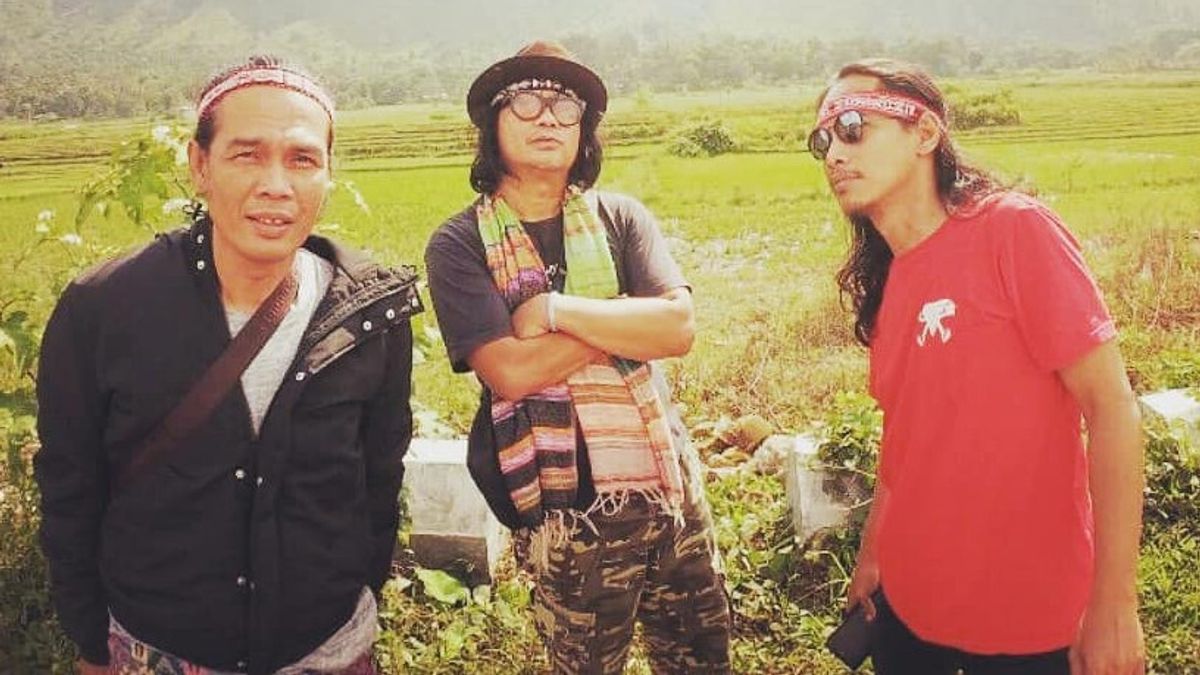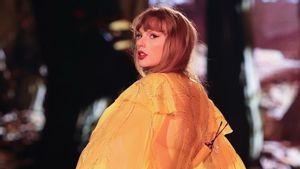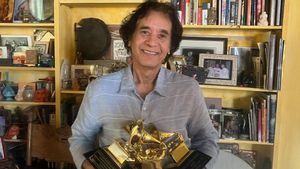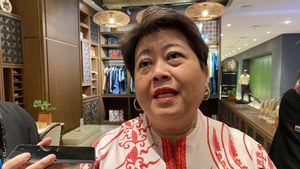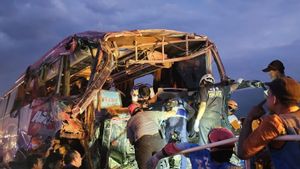JAKARTA - Bongky Ismail Marcel recently revealed to VOI, he and two of his colleagues from the band BIP; Indra Qadarsih and Pay Burman have obtained performance rights permits related to Slank's songs which they will perform at the 31F concert. Many people ask, what is performance rights?
As quoted from hukumonline.com, performing rights are the right to announce a song / music composition, including singing, playing, whether in the form of a recording or being performed live (live), via radio and television, including through other media such as the internet, live concerts and services. -programmed music service.
Bongky, Indra, and Pay in the 31F concert plan will present Slank songs from album era 1-5; Suit ... Suit ... He ... He (Sexy Girl) (1990), Kampungan (1991), Piss (1993), Generation Blue (1994), and Minority (1996) - albums released when they still joining and before being fired in 1996. For cover songs created for commercial purposes, the inclusion of the original singer's name is certainly not enough to avoid lawsuits from copyright holders.
And in order not to violate someone else's copyright - in this case Slank - to reproduce, record, distribute and or publish a song belonging to someone else, especially for commercial purposes, someone needs to obtain permission (license) from the creator / copyright holder.

But, weren't Bongky, Indra, and Pay also involved in the process of making all the songs on the five albums? We still keep Slank's first five albums neatly, including the album covers which are still smooth. In each of the song lyrics written in it, it is not accompanied by a description of who the creator is. This means that all the songs on the album belong to the five of them. But why did Bongky, Indra, and Pay have to ask permission from Kaka and Bimbim?
Bongky answered a similar question raised by a fan in a VOI Instagram post regarding this news which he reposted.
"What are you doing asking for permission? That's a song created by the three of you too, without a solid execution it won't be a hit, even if it's Bim2's raw song, if it's not concocted by you, it won't explode," wrote the account @abuhusnihabibiehamzah.
"Ethics," Bongky replied briefly. Could this be some kind of allusion to Bongky's use of the butterfly-shaped Slank logo that he designed and wore without permission? Can be. Bongky once sued this matter although it finally subsided.

Performance rights are regulated in Law no. 28 of 2014 concerning Copyright, along with a license to mechanical rights, namely the right to duplicate, reproduce (including rearrangement) and record a composition of music / songs on CDs, tapes and other recording media. Royalties for mechanical rights received are paid by the reproducing or recording party directly to the rights holder (usually a music publishing company (publisher) representing the composer / songwriter).
The royalty collection for the provision of performing rights is generally carried out by an institution (in Indonesia it is called the Collective Management Institute - "LMK") based on an agreement between the creator and the institution.
WAMI (Wahana Musik Indonesia) and YKCI (Yayasan Karya Cipta Indonesia) are two of several LMK in Indonesia that are currently actively collecting and distributing royalties from the use of performance rights to be forwarded to composers / songwriters and publishers.
So, instead of 'making a fuss, I don't really make love' (uh, sorry ... that's a cut from the lyrics of the song Pisah Saja). We mean, instead of the noisy fans whose song is whose song, we better pray that the 31F concert will be realized without any obstacles. Let the matter of copyright and other details be a matter for Slank and BIP personnel. Agree?
Performance rights permit before Bongky and BIP
Jikunsprain - guitarist / rif's side band, Jikun - brought back God Bless' song, Rock di Udara (1975) on his last album, Bertuhan dengan Marah (2017). Jikun admitted that he performed the song from 2014 because there was permission from its creator, Donny Fattah (bassist God Bless) a year earlier.
At that time (in 2013) there was no collective management agency regulating performance rights or mechanical rights. But when Jikun insisted on putting the song Rock in the Air into the album God with Anger, he returned to Donny Fattah to discuss more about the song.
A contract was drawn up whereby all the royalties from the sale of the song would be handed over to Donny. After signing the contract, Jikun also had the good faith to set aside the honorarium he would get to Donny if Jikunsparain performed the song on stage.
"The form of appreciation is not only in the form of recordings. If it produces something, I will also give it to the one who created it. So, in a year, there are a number of performances, cut and immediately given to Mas Donny. Likewise sales from iTunes, there are a year there. How much income was deducted and handed over to Mas Donny. That is a form of my appreciation for God Bless, who has 'poisoned' me since I was a child, "Jikun explained to us.
Taking place at the Caffee Shop Hotel Jayakarta, Bandung, May 14 2017, Jikun symbolically handed over royalties (mechanical rights and performance rights) for the song Rock di Air based on sales proceeds in digital format and stage performances as promised to Donny Fattah.
Performance rights are about the awareness of musicians
The Indonesian stage scene is not so well organized that anyone can freely sing other people's songs without asking permission. Why did Jerinx (Superman Is Dead) sing about himself when his song, Sunset di Tanah Anarchy, was performed by Via Vallen? There is a possibility that the song was not registered to publishing, so he personally took part. Or, the song had already been registered but because Via Vallen was comfortable performing the song without asking permission, Jerinx took the initiative to 'move'.
Performance rights regulations have been in place since 2014. For example, a musician doesn't know, he doesn't stand alone. There is management that oversees it. For that, management should understand and ask permission.
If the song is registered to publishing, then management must ask permission from the publishing company if the song is recorded and duplicated. However, if the song is performed at an event, the event organizer must ask the author's permission.
If said senior music observer Denny MR, this is back to the awareness of the musician and his management to ask permission to perform someone else's song. And it must be admitted, Malaysia, which is oriented towards Indonesia for music matters only, is in fact tidier and more orderly in regards to recording regulations and stage performances like this.
That is why, it must be returned to the artist in question. And what Bongky, Indra, and Pay did was right. While songwriters are still having a hard time claiming the rights to their work, a small event that has big significance is done by three rock stars in earnest. In fact, the songs on the five albums belong to them too.
The English, Chinese, Japanese, Arabic, and French versions are automatically generated by the AI. So there may still be inaccuracies in translating, please always see Indonesian as our main language. (system supported by DigitalSiber.id)
